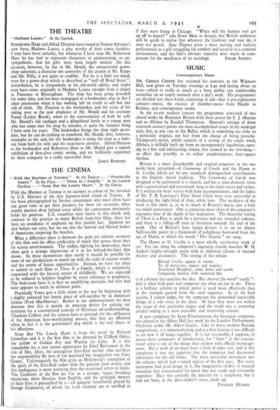THE CINEMA
" With the Marines at Tarawa." At the Empire.—" Practically Yours." At the Plaza.—" Three Is a Family." At the London Pavilion.—" None But the Lonely Heart." At the Odeon.
With the Marines at Tarawa is an account in colour of the invasion by U.S. Marines of the tiny Japanese-held island of Tarawa. It has been photographed by Service cameramen who must often have run great risks to get their pictures for there are occasions when nearby marines drop behind cover whilst the cameraman obstinately hold§ his position. U.S. casualties were heavy in this attack and, contrary to the practice in many British front-line films, there has been no avoidance of emphasis on that painful fact. Japanese are shot before our eyes, but we see also the burned and blasted bodies of Americans carpeting the beaches. What a difference there is between the grim yet salutary accuracy of this film and the effete artificiality of much that passes these days for screen entertainment. The soldier, fighting for democracy, must often gain a strange impression of it in his behind-the-lines film shows. In these momentous days surely it should be possible for more of our productions to match up with the scale of current events and the extent of future opportunities. Instead, we have too often to submit to such films as Three Is a Fainfly, which is exclusively concerned with the farcical nature of childbirth. We are expected to be reduced to helpless laughter by every reference to pregnancy. The bed-room farce is at best an unedifying spectacle, but here bad taste appears to reach its ultimate point. Practically Yours gets a little closer to the war by beginning with a highly coloured but heroic piece of self-sacrifice by an American airman (Fred MacMurray). Rather to our embarrassment we later discovet that this is merely an amusing device for gaining our attention for a conventional comedy of 'flirtatious misunderstanding. Claudette Colbert and the airman have to pretend, for the edification of the American hero-worshipping masses, that they are affianced when in fact it is the gentleman's dog which is the real object of his affections.
None But The Lonely Heart is from the novel by Richard Llewellyn and it is the first film to be directed by Clifford Odets, the author of Golden Boy and Waiting for Lefty. It is also remarkable for a rare screen appearance by Ethel Barrymore in the role of Mrs. Mott, the courageous East-End mother who sacrifices her respectability fbr love -of her wayward but imaginative son (Cary 'Grant). Unfortunately the film gives us Hollywood's conception of the spirit of the East-End rather than the genuine local article, and this inadequacy is more worrying than the occasional errors in locale. The Cockneys of the film are lost in a strange, "vague, brooding mysticism, more Russian than English, and the principal menace to their lives is personified by a rcal gangster (excellently played by ' George Couburis), of whom the local citizenry are as terrified as
if they were living in Chicago. "When will the human soul get up off its knees?" asks Ernie Mott in despair, but British audiences will be quick to realise that whatever the Cockney soul may do, it does not grovel. June Duprez gives a most moving and realistic performance as a girl struggling for comfort and security in a criminal environment, and the film's obvious sincerity does much to com- pensate for the woolliness of its sociology EDGAR ANSTEY.


























 Previous page
Previous page